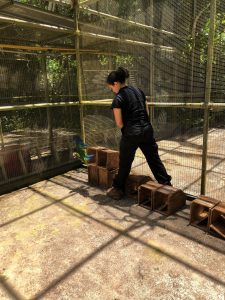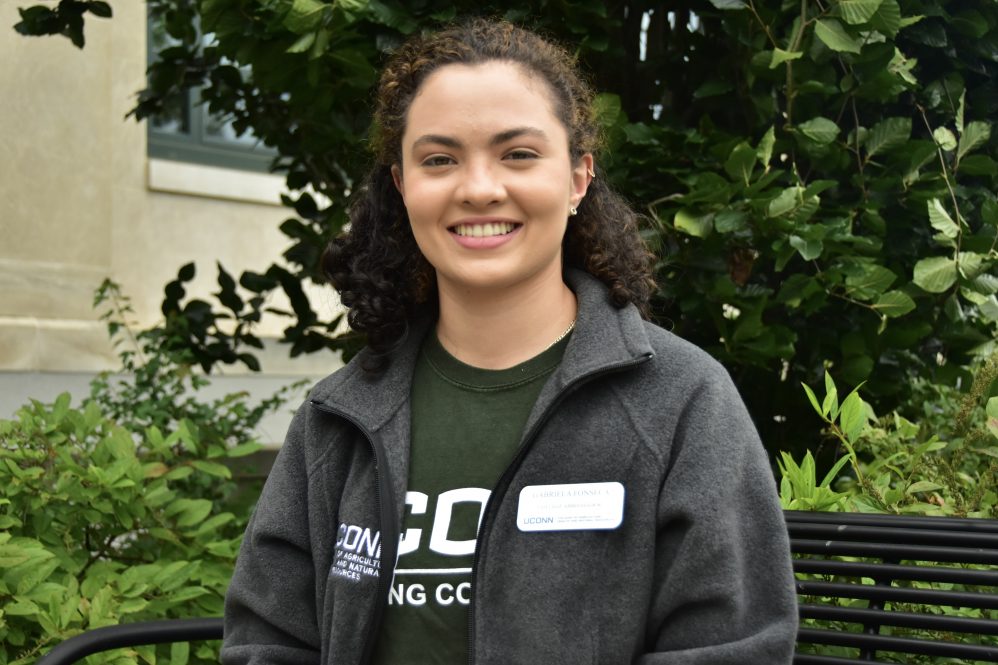Gabi Fonseca ’23 is a majoring in natural resources and animal science. She is part of the CAHNR Ambassadors program, a group of highly engaged students who promote and serve the College of Agriculture, Health and Natural Resources (CAHNR). Students in the program receive hands-on leadership experience through recruitment and other activities, like sharing their CAHNR Experience.
As someone born and raised in Puerto Rico, coming to Storrs, Connecticut was a major change. I was not only an out-of-state student, but I was also from another culture with different traditions, a different language, and a very different climate. Thanks to several people and programs within UConn’s College of Agriculture, Health and Natural Resources, this New England university hundreds of miles away from my Caribbean island now feels like a second home.
Ever since I was a child, I have been fascinated by wildlife and ecosystem conservation. Growing up, I always knew I wanted to study something that was related to wildlife and that would allow me to spend most of my time in the great outdoors. I decided to come to UConn because of CAHNR’s highly ranked pre-vet program and the beauty of the countryside campus (I’m not a fan of cities!) What I found when I got here were people that made me feel comfortable as an out-of-state student, who were always willing to help me out. I felt comfortable asking questions and expressing my needs, which not only helped me get used to the school, but also to pinpoint the right path for me in my UConn education.
While I started out in the animal science program, I knew I really wanted to work with wildlife more than farm animals. I started looking for wildlife-related clubs and study abroad trips. Through this process of asking questions and seeking help from the CAHNR community, I connected with Morty Ortega, associate professor in the Department of Natural Resources & the Environment (NRE). Having the opportunity to work with Dr. Ortega, another Latino specializing in wildlife conservation, was one of the most important experiences of my time at UConn. He shared information about study abroad opportunities, as well as course offerings through the NRE’s fisheries and wildlife concentration that helped me focus in on my interests and find my major.
In this program, I get hands-on experience to better understand wildlife-habitat interactions and how to implement the best management techniques. I also found my dream career: wildlife conservation and habitat restoration specialist. Once I graduate from UConn, I want to focus on wildlife behavior and ecosystem interactions to figure out the best way to help populations rise or stay within a healthy range.

I’ve been lucky to have more transformational, real-life work experience in Puerto Rico as well. CAHNR and its welcoming professors helped me find my path, which ended up connecting me with biologists back in Puerto Rico. Scientists at Aviario Bosque Rio Abajo, a US Fish and Wildlife regulated research facility in the property of the Department of Natural Resources of the state of Puerto Rico, study the endangered Puerto Rican parrot’s behavior with the goal of increasing their population on the island. During my internships with them, I have studied bonding and parental activities between the birds and conducted censuses and field studies on mating behavior. It was so exciting for me to combine the skills I’d learned at UConn on my home island.
And now I’m back in Storrs to bring that knowledge to my classmates and professors, many of whom also come from all over the world. Having such a diverse community in CAHNR is one of its greatest assets – it not only helps new students find people with a similar background, but it helps them make new connections. As an out-of-state individual, I know I am patient with people in similar situations who are trying to figure out a way around a new state, culture, country, and even language. Everyone at CAHNR welcomed me and helped me in any way they could. Being one of the closer-knit colleges on campus means we can support each other this way, connecting each other to the right people and resources, and helping everyone find their second home.
Follow UConn CAHNR on social media.



